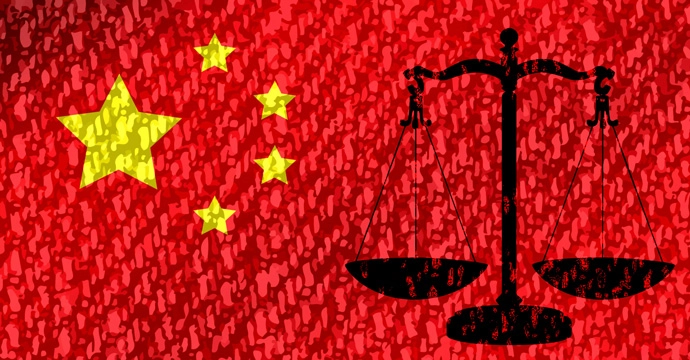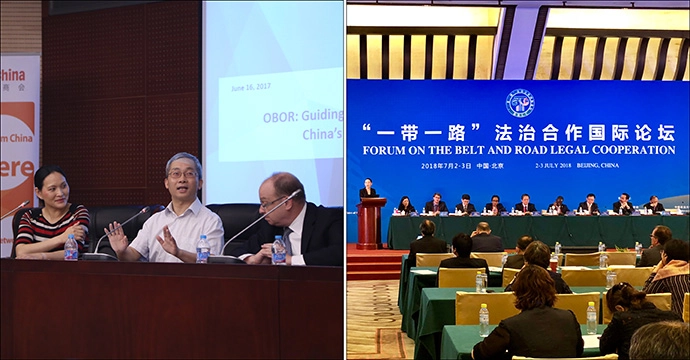China’s NEW Proactive Approach to Enforcing Foreign Judgments

Image: George Hodan, Royal Courts of Justice (Publicdomainpictures.net)
The coming into effect of China’s Foreign State Immunity Law at the beginning of 2024 has sparked concerns about how the Chinese judiciary will subject foreign states to the Chinese legal system because the law represents China’s transition from affording foreign states “absolute immunity” in Chinese courts to restricting the immunity to certain types of lawsuits. Amidst these concerns, the Supreme People’s Court just released a Guiding Case to illustrate its new, proactive approach to recognizing and enforcing foreign judgments. This approach not only evokes more optimism about the Chinese judiciary, but also increases the capacity of Chinese courts to help China revive its economy in 2025 and beyond by increasing the confidence of foreign parties in China’s willingness to recognize and enforce foreign judgments.
Arbitration and China’s Global Business

Image: Linnaea Mallette, Shipping Port (Publicdomainpictures.net)
The growing importance of global business to China makes it crucial for the country to show its commitment to recognize and enforce foreign arbitral awards. Since 1987, China has been a contracting state of the New York Convention, which requires each contracting state to ensure that its judiciary recognizes and enforces an arbitral award made in another contracting state, unless such recognition or enforcement would be contrary to the contracting state’s “public policy”, among other exceptions. The convention does not interpret the “public policy” exception. How the Chinese judiciary interprets it directly influences foreign parties’ level of confidence in doing business with China. A recent court case in China sheds light on the interpretation of this exception.
The Olympics, Overseas Chinese, & Foreign Laws

Image: Gerd Altmann, Hurry Up (Publicdomainpictures.net)
China’s impressive performance during the 2024 Summer Olympics has heightened many overseas Chinese’s interest in their own Chinese roots. This will likely boost their fascination with opportunities emerging from China, whose economy the IMF predicts will grow 5% in 2024. Beijing should, therefore, be motivated to step up its efforts to effectively engage overseas Chinese, who have been perceived by Beijing as important bridges connecting China with the rest of the world. Coincidentally, the Supreme People’s Court’s new initiative regarding the ascertainment of foreign laws can help engage overseas Chinese effectively.
China’s Top Court Frees “Several” Birds with One Key

Image: Linnaea Mallette, Mountain Landscape Illustration (Publicdomainpictures.net)
A little-known Q&A tool used within China’s court system since 2023 was recently brought to the spotlight. With its promising performance, the tool allows China’s highest court to “free several birds with one key”. The far-reaching impact of the tool also lays a solid foundation for China to develop AI-assisted adjudication.
China’s “One Website, Two Databases” Approach to Judicial Transparency

Image: Gerd Altmann, Seek (Publicdomainpictures.net)
To alleviate growing concerns about the future of a key website used by Chinese courts to publish millions of judgments, the Supreme People’s Court took an unusual step recently not only to confirm the continued operation of the website, but also to announce the establishment of two new databases. With the two databases, the Chinese judiciary will be able to formulate data-driven judicial reform measures and increase judicial consistency. While the databases help address deficiencies of the website, it is worth noting that the website—an indispensable platform to safeguard judicial transparency—plays a unique role in enhancing the value of these databases.
The Future of China’s Real Estate Sector

Image: Petr Kratochvil, Apartment Building Pattern (Publicdomainpictures.net)
How courts in China handle cases involving struggling real estate developers will affect foreign investors’ confidence in the entire Chinese market. The Supreme People’s Court recently highlighted the enforcement of a series of cases involving a real estate developer. These cases provide indications illuminating how courts in China are expected to follow suit to achieve “good political, social, and legal effects”.
Lawsuits Against China’s State-Owned Enterprises & Government Agencies

Images: Kai Stachowiak, Background Wallpaper;
icon0 com, China Flag Themes Idea (Publicdomainpictures.net)
Is there any chance for a private enterprise to win a lawsuit against a state-owned enterprise or a government agency in China? In an apparent attempt to boost confidence in the Chinese market, the Supreme People’s Court of China has signaled an affirmative answer to this question by releasing two court cases. Will the positive treatment of private enterprises, as demonstrated in these two cases, become a norm?
Guiding Case No. 196: Top Court’s Liberal Approach to Arbitration

Image: Petr Kratochvil, Science And Technology (Publicdomainpictures.net)
Guiding Case No. 196 (“GC196”) holds that, under Chinese law, an agreement to arbitrate is independently enforceable, even if the agreement was intended to be part of a larger contract that never fully formed. Through a comparison of GC196 with U.S. law, Tyler Atkinson explains why GC196 shows that Chinese law is arguably more favorable to arbitration than the law of the United States, a jurisdiction that, itself, strongly favors arbitration. He also shares practical insights about what companies affected by GC196 should do to avoid the risk of being forced into arbitration.
Guiding Case No. 196

Image: Mohamed Mahmoud Hassan, Contract Signature (Publicdomainpictures.net)
In December 2022, the Supreme People’s Court of China released Guiding Case No. 196 to provide significant guiding principles regarding the validity of an arbitration clause even though the contract that contains the clause has not been formed. These principles will have a considerable impact on legal practice.
Guiding Cases Empowered by a Chinese High Court’s Retrial Order

Image: xtock (Shutterstock.com)
The highest court in a province in China recently ordered a retrial of a dispute because lower-level courts handling the dispute failed to discuss in their reasoning a relevant Guiding Case cited by a party as similar to the dispute. This ruling is expected to bring about positive changes to the judicial practice of using Guiding Cases in that province. Why? Will this ruling be a game changer for the rest of the country?
China’s Belt and Road Initiative & Legal Reform

This piece describes how the release of Typical Cases related to China’s Belt and Road Initiative in 2015 ultimately led Dr. Mei Gechlik to make a suggestion at a 2018 international forum organized by the Chinese government […].
Courts in China, AI, and Guiding Cases

What is China’s policy goal regarding the application of artificial intelligence to adjudication? This piece of SINOTALKS.COM In Brief tells you the answer and explains why Guiding Cases are important to the accomplishment of this goal.
